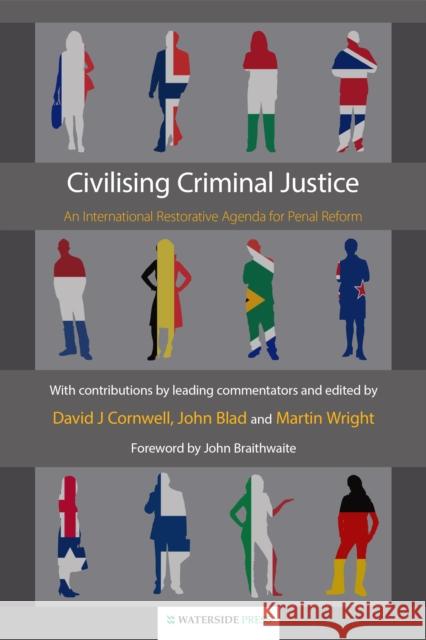Civilising Criminal Justice: An International Restorative Agenda for Penal Reform » książka
Civilising Criminal Justice: An International Restorative Agenda for Penal Reform
ISBN-13: 9781904380047 / Angielski / Miękka / 2013 / 568 str.
Probably the best collection there is, Civilizing Criminal Justice is an inescapable resource for anyone interested in restorative justice: truly international and packed with experience while combining history, theory, developments and practical advice.This volume of specially commissioned contributions by widely respected commentators on crime and punishment from various countries is a 'break-through' in bringing together some of the best arguments for long-overdue penal reform. An increasingly urgent need to change outmoded criminal processes, even in advanced democracies, demands an end to those penal excesses driven by political expediency and damaging notions of retribution, deterrence and punishment for its own sake. 'Civilising' criminal justice will make it fairer, more consistent, understandable and considerate towards victims of crime, currently largely excluded from participation. Principles of reparative and restorative justice have become increasingly influential in the quest to provide justice which tackles harm, compensates victims, repairs relationships, resolves debilitating conflicts and calls offenders to account. And in any case, what real justification is there for subjecting more and more people to the expensive but hollow experience of prison, especially at a time of economic stringency. Civil justice - in its various forms - can be swifter, cheaper and more effective, in court or through mediated processes focusing on the harmful consequences of offences rather than inflicting punishment that may satisfy a baying media but come home to haunt the community. This brave and generous book (600 pages) illustrates the many different ways in which criminal justice can be 'civilised' and how lessons can be learned from practical experience across the world and shared expertise. It is a volume that every politician should read, every criminal justice professional should possess, and that every student of criminology and penology will find invaluable. David Cornwell, John Blad and Martin Wright are three of the leading international experts on this topic with many publications to their names individually. Contributors: Serge Gutwirth and Paul De Hert (Belgium), Federico Reggio (Italy), Bas van Stokkom (The Netherlands), Lode Walgrave (Belgium), Susan Easton and Christine Piper (UK), Louis Blom-Cooper QC (UK), Tapio Lappi-Seppala (Finland), Thomas Trenczek (Germany), Jean-Pierre Bonafe-Schmitt (France), Per Andersen (Norway), Claire Spivakovsky (Australia), Ann Skelton (Republic of South Africa), Borbala Fellegi (Hungary), Judge Fred McElrea (New Zealand); and the editors. John Braithwaite is a Distinguished Professor at the Australian National University, author of ground-breaking works on restorative justice and recipient of various awards.
Probably the best collection there is, Civilizing Criminal Justice is an inescapable resource for anyone interested in restorative justice: truly international and packed with experience while combining history, theory, developments and practical advice.This volume of specially commissioned contributions by widely respected commentators on crime and punishment from various countries is a break-through in bringing together some of the best arguments for long-overdue penal reform. An increasingly urgent need to change outmoded criminal processes, even in advanced democracies, demands an end to those penal excesses driven by political expediency and damaging notions of retribution, deterrence and punishment for its own sake. Civilising criminal justice will make it fairer, more consistent, understandable and considerate towards victims of crime, currently largely excluded from participation. Principles of reparative and restorative justice have become increasingly influential in the quest to provide justice which tackles harm, compensates victims, repairs relationships, resolves debilitating conflicts and calls offenders to account. And in any case, what real justification is there for subjecting more and more people to the expensive but hollow experience of prison, especially at a time of economic stringency. Civil justice - in its various forms - can be swifter, cheaper and more effective, in court or through mediated processes focusing on the harmful consequences of offences rather than inflicting punishment that may satisfy a baying media but come home to haunt the community. This brave and generous book (600 pages) illustrates the many different ways in which criminal justice can be civilised and how lessons can be learned from practical experience across the world and shared expertise. It is a volume that every politician should read, every criminal justice professional should possess, and that every student of criminology and penology will find invaluable.David Cornwell, John Blad and Martin Wright are three of the leading international experts on this topic with many publications to their names individually. Contributors: Serge Gutwirth and Paul De Hert (Belgium), Federico Reggio (Italy), Bas van Stokkom (The Netherlands), Lode Walgrave (Belgium), Susan Easton and Christine Piper (UK), Louis Blom-Cooper QC (UK), Tapio Lappi-Seppälä (Finland), Thomas Trenczek (Germany), Jean-Pierre Bonafé-Schmitt (France), Per Andersen (Norway), Claire Spivakovsky (Australia), Ann Skelton (Republic of South Africa), Borbála Fellegi (Hungary), Judge Fred McElrea (New Zealand); and the editors. John Braithwaite is a Distinguished Professor at the Australian National University, author of ground-breaking works on restorative justice and recipient of various awards.











